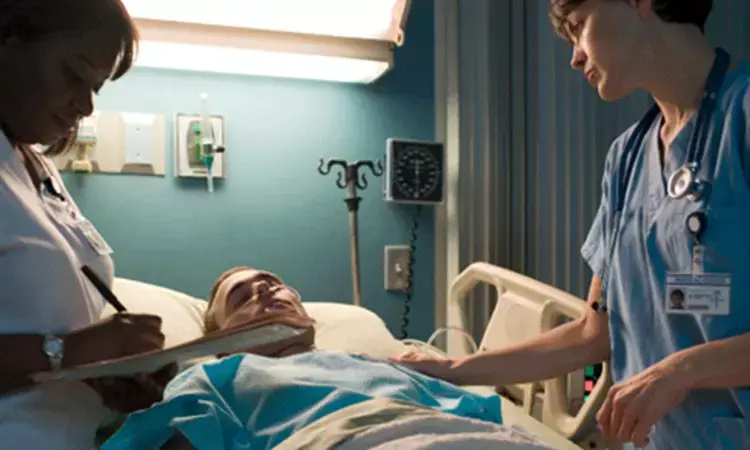- Home
- Medical news & Guidelines
- Anesthesiology
- Cardiology and CTVS
- Critical Care
- Dentistry
- Dermatology
- Diabetes and Endocrinology
- ENT
- Gastroenterology
- Medicine
- Nephrology
- Neurology
- Obstretics-Gynaecology
- Oncology
- Ophthalmology
- Orthopaedics
- Pediatrics-Neonatology
- Psychiatry
- Pulmonology
- Radiology
- Surgery
- Urology
- Laboratory Medicine
- Diet
- Nursing
- Paramedical
- Physiotherapy
- Health news
- Fact Check
- Bone Health Fact Check
- Brain Health Fact Check
- Cancer Related Fact Check
- Child Care Fact Check
- Dental and oral health fact check
- Diabetes and metabolic health fact check
- Diet and Nutrition Fact Check
- Eye and ENT Care Fact Check
- Fitness fact check
- Gut health fact check
- Heart health fact check
- Kidney health fact check
- Medical education fact check
- Men's health fact check
- Respiratory fact check
- Skin and hair care fact check
- Vaccine and Immunization fact check
- Women's health fact check
- AYUSH
- State News
- Andaman and Nicobar Islands
- Andhra Pradesh
- Arunachal Pradesh
- Assam
- Bihar
- Chandigarh
- Chattisgarh
- Dadra and Nagar Haveli
- Daman and Diu
- Delhi
- Goa
- Gujarat
- Haryana
- Himachal Pradesh
- Jammu & Kashmir
- Jharkhand
- Karnataka
- Kerala
- Ladakh
- Lakshadweep
- Madhya Pradesh
- Maharashtra
- Manipur
- Meghalaya
- Mizoram
- Nagaland
- Odisha
- Puducherry
- Punjab
- Rajasthan
- Sikkim
- Tamil Nadu
- Telangana
- Tripura
- Uttar Pradesh
- Uttrakhand
- West Bengal
- Medical Education
- Industry
Do Fewer disturbances from nighttime checks translate into better sleep in hospitalised patients?

Sleep has major consequences for physical and emotional well-being. Insomnia in hospitalized adults is a common condition and a source of patient dissatisfaction.
A recent study suggests that a predictive algorithm, paired with targeted and informative clinical decision support (CDS), can assist physicians to identify stable hospitalized patients. They found no significant harm in reducing overnight vital sign checks in such patients. However, the predictive algorithm does not reduce the incidence of delirium. The study findings were published in the JAMA Internal Medicine on December 28, 2021.
Iatrogenic interruptions are a major cause of sleep deprivation in hospitalized patients. Whether CDS, including analytics to target sleep promotion interventions to appropriate patients, would be safe and effective is unclear. Therefore, Dr Nader Najafi ad his team conducted a study to determine whether a clinical decision support tool, powered by real-time patient data and a trained prediction algorithm, can help physicians identify clinically stable patients and safely discontinue their overnight vital signs checks.
They conducted a randomized clinical trial and noted 3,025 total encounters screened by the CDS tool. The researchers then randomized 966 patient encounters to the intervention arm and 964 to the usual care arm. They also included physicians serving the patients on the general medical service.
The CDS tool notified physicians to patients who were at low risk for abnormal nighttime vital signs and therefore candidates for a skipped nighttime vital sign check. CTS Tool was based on a logistic regression model that used real-time patient data as input.
The major outcome assessed was the incidence of delirium, determined by bedside nurse assessment of Nursing Delirium Screening Scale scores, a standardized delirium screening tool (delirium diagnosed with score ≥2). They also assessed the mean nighttime vital sign checks. Potential harms were determined as intensive care unit transfers and code blue alarms.
Key findings of the study:
- Upon analysis, the researchers found that the sleep promotion intervention was not associated with a reduction in delirium compared with usual care in the general medicine service (11% vs 13%).
- However, they noted a 31% reduction in vital sign checks per night in the intervention arm with no potential harms, suggesting that for some patients, overnight vital sign checks can be reduced with no adverse effects.
"It is not surprising that the intervention was not able to decrease the incidence of delirium. Hospital delirium has many contributors, and the reduction in vital signs checking, although statistically significant, was relatively small," according to the editorialists.
The authors concluded, "Results of this randomized clinical trial suggest that the model we have described herein, a predictive algorithm that identifies clinically stable patients for whom a hospital intervention can be safely discontinued, has potential applications beyond measurement of vital signs. Continuous cardiac monitoring, higher level of care, and routine daily blood tests are all scenarios that could benefit from a similar approach."
For further information:
Medical Dialogues Bureau consists of a team of passionate medical/scientific writers, led by doctors and healthcare researchers. Our team efforts to bring you updated and timely news about the important happenings of the medical and healthcare sector. Our editorial team can be reached at editorial@medicaldialogues.in.
Dr Kamal Kant Kohli-MBBS, DTCD- a chest specialist with more than 30 years of practice and a flair for writing clinical articles, Dr Kamal Kant Kohli joined Medical Dialogues as a Chief Editor of Medical News. Besides writing articles, as an editor, he proofreads and verifies all the medical content published on Medical Dialogues including those coming from journals, studies,medical conferences,guidelines etc. Email: drkohli@medicaldialogues.in. Contact no. 011-43720751


